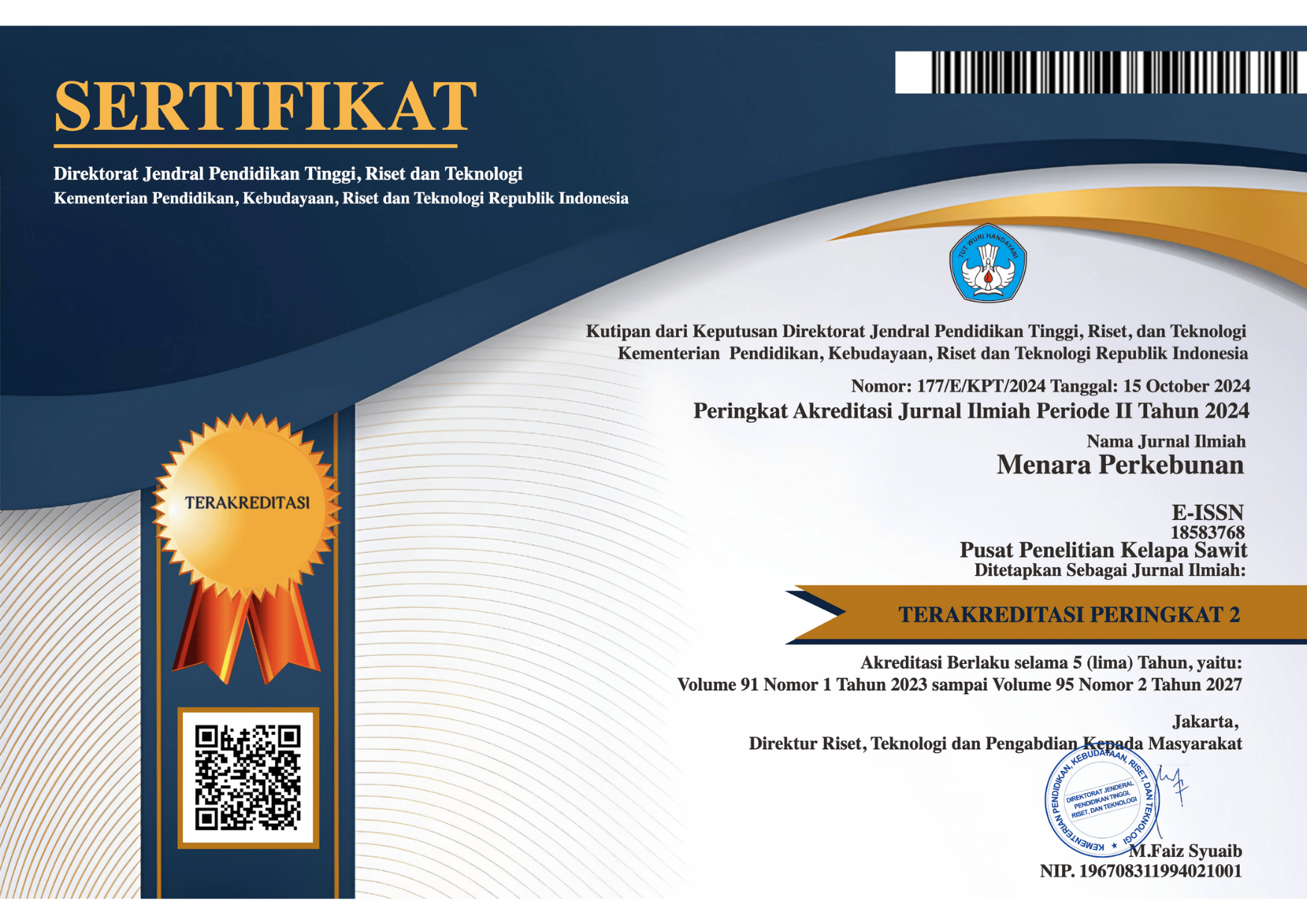Physiological and biochemical changes in cocoa seed (Theobroma cacao L.) caused by desiccation Perubahan fisiologi dan biokimia benih kakao (Theobroma cacao L.) akibat desikasi
DOI:
https://doi.org/10.22302/iribb.jur.mp.v68i1.135Keywords:
Theobroma cacao, desiccation toler¬ance, recalcitran seed, seed's-bio¬chemical characters, seed's-physio¬logical charactersAbstract
Ringkasan
Benih kakao tergolong rekalsitran, benihnya sensitif terhadap desikasi dan apabila disimpan pada kondisi yang menyebabkan kehilangan air, benih akan kehilangan viabilitasnya. Viabilitas benih kakao hanya dapat dipertahankan beberapa hari saja dalam keadaan terbuka pada suhu kamar. Hal ini merupakan kendala dalam penyimpanan dan pengiriman benih kakao. Tujuan penelitian ini adalah untuk menetapkan pengaruh desikasi terhadap karakter fisiologis dan biokimia benih kakao. Benih ICS 60 (kakao lindak) dan DR2 (kakao mulia) diletakkan dalam cawan Petri kemudian disimpan pada suhu 25oC dan Rh 55-75% selama empat hari. Percobaan dilakukan dengan rancangan petak terpisah, petak utama adalah kandungan air awal dan kritikal. Sebagai anak petak adalah jenis kakao, masing-masing diulang empat kali. Peubah fisiologis yang diukur adalah viabilitas benih mencakup kandungan air benih, potensi tumbuh maksimum, daya berkecambah, kecepatan tumbuh, bobot kering kecambah normal, dan laju pertumbuhan kecambah normal. Di samping itu juga dilakukan pengamatan pola pita protein benih yang dianalisis dengan SDS-PAGE. Kandungan asam absisik (ABA) dan gula stahiosa, raftnosa, glukosa, fruktosa, arabinosa, silosa, serta sukrosa dalam benih yang ditetapkan dengan HPLC Integritas membran benih ditetapkan berdasarkan daya hantar listrik air perendaman benih yang diukur dengan konduktometer. Hasil yang diperoleh menunjukkan bahwa adanya interaksi yang nyata antara desikasi dengan seluruh tolok ukur fisiologis. Desikasi menyebabkan penurunan daya berkecambah, bobot kering dan laju pertumbuhan kecambah normal, potensi tumbuh maksimum dan kecepatan tumbuh. Sedang untuk, kandungan ABA, sukrosa, arabinosa dan rafinosa mengalami peningkatan. Di samping itu desikasi menyebabkan dibentuknya protein baru dengan BM 32,5; 47,0 dan 51,0 kDa (DR2); 47,0 dan 51,0 kD (ICS 60). Beberapa protein yang hilang oleh pengaruh desikasi yaitu dengan BM37, 0 (DR2), 19, 0 dan 37, 0 kD (ICS60). Benih ICS60 lebih tahan terhadap desikasi dibandingkan dengan benih DR2.
Summary
Seed of cocoa is recalcitrant and sensitive to desiccation. In open condition at room temperature, the viability of cocoa seed ultimately lost for several days. These characters are a problem for seed storage and delivery. The objectives of this study are to investigate the effect of desiccation on physiological and biochemical characters of cocoa seed. Seeds of ICS 60 (bulk cocoa) and DR2 (fine cocoa) were placed on Petri dishes and stored at 25oC, Rh 55-75% for four days (critical water content). The experiment was conducted with split plot analysis, (1) The main plot was the storage condition initial and critical seeds water content. (2) The sub plot was the variety of cocoa, with four replications of each treatment. The effect of desiccation on seeds viability was tested, based on seed water content, maximum growth potential, seed germination, germination rate, dry weight of normal seedling, and seedling growth rate. Besides, the changes of seed proteins band pattern were also analysed by SDSPAGE. Abscisic acid, stachyose, raffnose, fructose, arabinose, xyllose, and sucrose seed content were determined by HPLC. The integrity of seed membrane based on the leakage of electrolytes from seeds was measured with a CM 100 multicell conductivity meter. The results showed that there is an interaction with highly significant correlation between desiccation and all of the physiological and biochemical parameters. Desiccation caused the decrease of seed germination, dry weight and growth rate'of normal seedling, maximum growth potential, and germination rate and while the leakage of electrolytes, ABA, sucrose, arabinose and raffinose increased. Besides, desiccation was also caused the formation of new proteins with MW 32.5, 47,0 and 51,0 kDa (DR2); 47,0 and 51,0 kD ICS 60) . On the other hand, several protein were disappeared i.e. MW 37,0 (DR2), 19,0 and 37,0 kD (ICS60). Seeds of ICS 60 are more tolerant to desiccation than seeds of DR2.
Downloads
Downloads
Submitted
Accepted
Published
How to Cite
Issue
Section
License
Authors retain copyright and grant the journal right of first publication with the work simultaneously licensed under a Creative Commons Attribution License that allows others to share the work with an acknowledgement of the work's authorship and initial publication in this journal.













